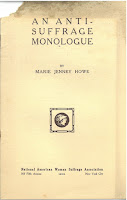In this particular instance, we want to talk about the vigorous pamphlet war that cropped up during the suffragist movement in the early-20th century. Exhibit A is the reprint of an article published in Harper's Bazaar in 1894 and written by Jeannette L. Gilder, "founder of The Critic," a New York-based magazine of literary criticism. In the article, Gilder (a self-described "working-woman") says that "we cannot worship God and Mammon; neither can we be politicians and women. It is against nature, against reason." She concludes by stating that voting cannot help women, but it can hurt them, just a like a bomb that could "go off in her own hands, and work a mischief that she little dreams of."
 Other anti-suffragists quickly joined the fray. One William T. Sedgwick, "noted biologist" and M.I.T. Professor of Biology and Public Health, emphatically states that women are biologically different from men and therefore constitutionally incapable of the same sorts of intellectual and physical work of men. Essentially, Sedgwick claims the menstrual cycle is an insurmountable "handicap" that means women shouldn't vote. He believes that "the particular insane restlessness which is now affecting certain classes of women in America and England seems to be due to the comparative idleness from which they suffer through the gradual removal of the old domestic industries." So, in other words, technological innovations in the domestic sphere have resulted in women's boredom and so they are now "shrieking for 'liberty'".
Other anti-suffragists quickly joined the fray. One William T. Sedgwick, "noted biologist" and M.I.T. Professor of Biology and Public Health, emphatically states that women are biologically different from men and therefore constitutionally incapable of the same sorts of intellectual and physical work of men. Essentially, Sedgwick claims the menstrual cycle is an insurmountable "handicap" that means women shouldn't vote. He believes that "the particular insane restlessness which is now affecting certain classes of women in America and England seems to be due to the comparative idleness from which they suffer through the gradual removal of the old domestic industries." So, in other words, technological innovations in the domestic sphere have resulted in women's boredom and so they are now "shrieking for 'liberty'".Thankfully, there are suffragist voices in print during this period as well. In response to an anti-suffrage pamphlet written in 1913 by Minnie Bronson, "formerly Special Agent, Bureau of Labor," two suffragettes published a devastating reply. Edith Abbott, Ph.D. in Economics and Law, and Sophonisba Breckenridge, Assistant Professor of Social Economy, both of the University of Chicago, dismantle Bronson's arguments in a brutal step-by-step fashion. Before they even begin, however, they undermine Bronson's claim to any authoritative position by revealing that her tenure as an employee of the Labor Department was fleeting; instead, her primary occupation was a high school math teacher and then a paid representative of anti-suffragists. This revelation is preceded by a blunt statement that, in arguing that suffrage will not lead to better treatment of women in industry, "Miss Minnie Bronson stands practically alone, opposed to the women who, as a result of long years of experience, are qualified to speak as to the conditions under which women work."
Other suffragists turn to humor and sarcasm instead of rhetorical rebuttals. Our personal favorite is a tongue-in-cheek rant by Marie Jenney Howe. Titled "An Anti-Suffrage Monologue," the pamphlet deftly skewers the hypocrisy and illogical positions of the anti-suffragist movement. Some choice excerpts:
"Many men call me an angel and I have a strong instinct which tells me it is true; that is why I am an anti, because 'I want to be an angel and with the angels stand.' And if you don't like that argument take this one. Women are depraved. They would introduce into politics a vicious element which would ruin our national life."
"Women cannot band together. They are incapable of organization. No two women can even be friends. Women are cats. On the other hand, if women were enfranchised, we would have all the women banded together on one side, and all the men banded together on the other side, and there would follow a sex war which might end in bloody revolution."
These fascinating and occasionally amusing pamphlets (whether intentionally or not) are from the papers of Jesse Belle Hardy Stubbs MacKaye within the larger MacKaye Family Papers (ML-5). She was the president of the Milwaukee Women's Peace Society. To see this amazing collection of pamphlets, come to Special Collections and ask for Box 227 from the MacKaye Family Papers (ML-5).



No comments :
Post a Comment